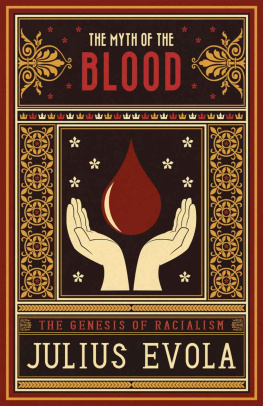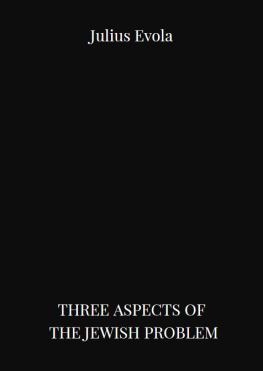Julius Evola
A Handbook for Right-Wing Youth
Foreword by Gbor Vona
Arktos
London 2017
Published in 2017 by Arktos Media Ltd.
www.arktos.com
A Handbook for Right-Wing Youth Facebook Page
Arktos Facebook page
All rights reserved. No part of this book may be reproduced or utilised in any form or by any means (whether electronic or mechanical), including photocopying, recording or by any information storage and retrieval system, without permission in writing from the publisher.
Originally published as Jobboldali fiatalok kziknyve by Kvintesszencia Kiad in Debrecen, Hungary, 2012.
Translation:
SK
E Christian Kopff
Anna Gyulai
Editor:
John B Morgan
Cover and Layout:
Tor Westman
ISBN 978-1-912079-60-5 (Softcover)
ISBN 978-1-912079-59-9 (Hardback)
ISBN 978-1-912079-58-2 (Ebook)
Editors Note
This book is a collection of essays that has no equivalent among the original Italian publications by Julius Evola, having been assembled from essays originally printed in Italian periodicals over the course of Evolas lifetime by the Hungarian traditionalists, as described in the Bibliographical Notes. The Hungarian edition of this book was published by the traditionalist house Kvintesszencia Kiad (www.tradicio.org) in Debrecen, Hungary in 2012. We extend our sincerest gratitude to Dr Tibor Imre Baranyi and the rest of the staff of Kvintesszencia Kiad for allowing us to create an English edition of this book, and to Gbor Vona, Chairman of the Jobbik party, for giving us permission to use his Foreword.
All of Evolas essays were translated from the original Italian by SK, with the exception of Orientations: Eleven Points, which was translated from the Italian by Professor E Christian Kopff. The Foreword and the Bibliographical Notes were translated from the Hungarian by Anna Gyulai. We extend our particular thanks to Prof Kopff and Ms Gyulai, who did their work as volunteers.
The original dates and places of publication for all of Evolas essays are given in the Bibliographical Notes.
The footnotes to the text were added by me, and are so marked; those footnotes which have no attribution were part of the original Italian texts and were added by Evola himself. Where sources in other languages have been cited, I have attempted to replace them with existing English-language editions. Citations to works for which I could locate no translation are retained in their original language. Website addresses for online sources were verified as accurate and available in January 2017.
The Hungarian edition of this book was edited by Dr Tibor Imre Baranyi and Rbert Horvth.
J OHN B M ORGAN IV
Budapest, Hungary, 18 January 2017
Foreword
by Gbor Vona
Julius Evola is a well-known figure, and yet also still in a way unknown. A large part of the reading publicthanks either to philistinism or to the influence of a very malicious groupreckons the Italian author to be a sort of esoteric fascist. To show how untenable, superficial, and vile this definition is, we wont even bother to respond to it in this Foreword. Julius Evola was one of the greatest thinkers of the twentieth century, andbesides Ren Gunon a decisive personality in the propagation of traditionalism.
The subjects of his writings are so extensive, the quality of his works so profound, that they are unprecedented: his writings on hermeneutics, politics, magic, history, yoga, alchemy, Buddhist asceticism, and sexuality are all of fundamental importance. Unlike other great critics of the modern age, he was not only able to describe a general feeling of crisisthough he accomplished this more deeply than almost anyone elsebut to provide guidance, and in this guidance there was no corruptive notion, and he made no compromises. The type of aristocracy he advocated was not only an innate capability, but a conscious, reasoned, and preserving programme for life. His oeuvre and his life: the rebellion of quality . This book is an anthology, a handbook for Right-wing youth. But what is the Right and who are the youth, according to Evola? We will try to provide a short answer in this Foreword.
For Evola, Right-wing youth is not what common opinionespecially nowadays, and especially here, in Hungarythinks it is. But before analysing what it is for him, lets briefly look at what our time thinks about it in general. Just like everything else in the modern era, this concept is determined by the monopoly of Left-wing, liberal opinion. And with such power, which isnt even questioned by the majority, the mental horizon of the latter doesnt even go so far as to ask the most basic questions. Well, who could have doubts when they said it on television? The image of Right-wing youth which is made for and devoured by the idiotic, consumer couch potatoes is the following: protesters with masks on their faces, fighting policemen in a cloud of tear gas; primitive, violent, uncontrolled. I dont think that the average person would question this claim, although in many European countries, this description actually matches the extreme Leftist youth as well. So its not that simple. Not to mention that those who participate in street riots can be driven by very different values and motives. In most cases they are driven by dissatisfaction and desperation, but protest against a particular political situation or a simple lust for destruction can also be motives. In political discourse, the picture is only a little more detailed: it regards Right-wing youth as nationalists who are authoritarian, intolerant, xenophobic, and less sensitive to social problems. This description goes a bit deeper than viewing them merely as street fighters, admitting that they have some sort of coherent set of values, but they quickly add to it that most elements of the Right are outdated.
The potential of the Right to offer its own explanations and influence the war of concepts is a lot slimmer than that of the Leftist monopoly on opinion. This is not only because of the narrower possibilities offered by the existing resources, but also because of the vagueness of its own set of concepts; their incoherence, as well as their infection by Leftism and especially liberalism. The everyday Rightaccording to its own self-imageloves its nation, its historical heritage, its culture, and its symbols. It is anti-Communist, anti-liberal, and pro-order. Therefore the Right-wing youth is the person who believes in these values and regards them as guiding principles. But when the Right follows these principles, unavoidably theres a bad feeling about it, considering that its lot in the world at the present time is weakness and an apparently permanent loss of competitiveness against Left-liberal modernism. This negative feeling is not new; it is centuries old. This feeling of being forced to retreat is responsible for the fact that the Right usually believes that while its aims are good, its tools are weak. And from this desperate conclusion almost automatically comes another, no less desperate conclusion: that it should apply the tools of the Left to bring about its own success. The tragedy of this situation is that the tools of the Left are infectious. This creates a political catastrophe which is extremely common nowadays: the landscape of the so-called Right is in reality becoming more and more filled with Leftist ideas, and allows the Lefts borders to approach closer and closer, displaying and mainstreaming the pseudo- or fake Rightism. Of course, this results in total confusion, schizophrenia, and a chaos of ideas. And for those who are disenchanted by the play-fighting of the Left and the pseudo-Right over illusory differences, but still have Right-wing motives and intuitionsfor them remains the purely external, pointless opposition to the Left, which has been stripped of its intellectual coherence as well as the basis of its ideology and values:
Next page













